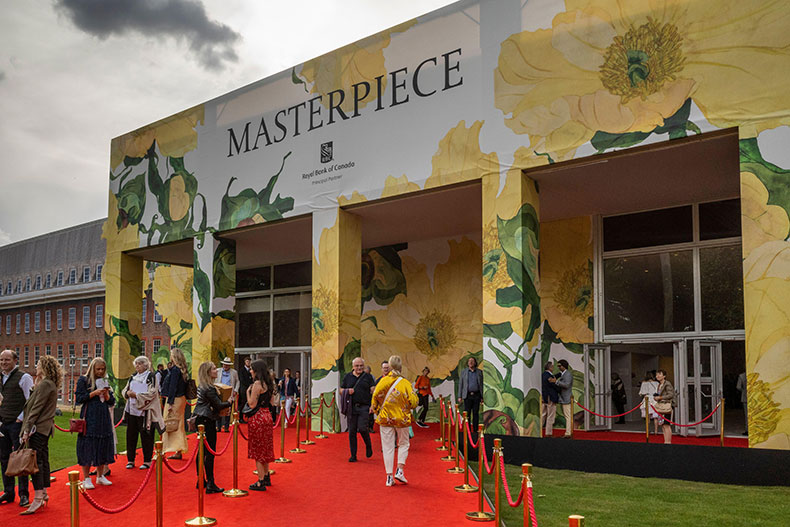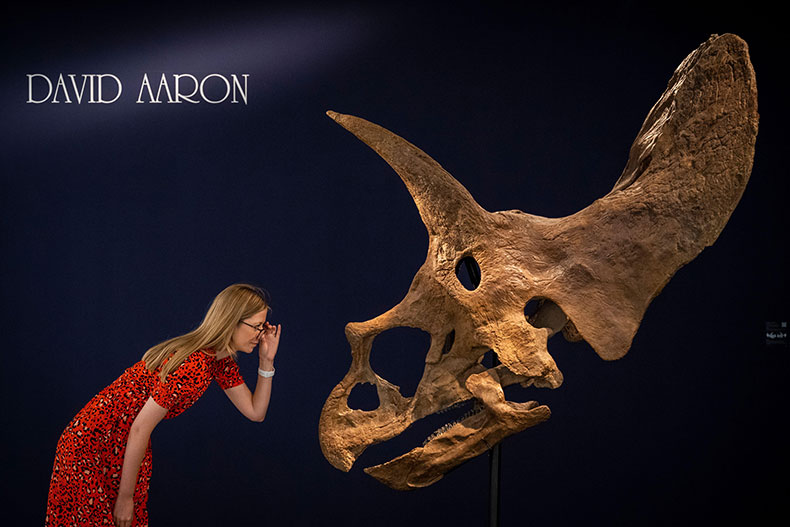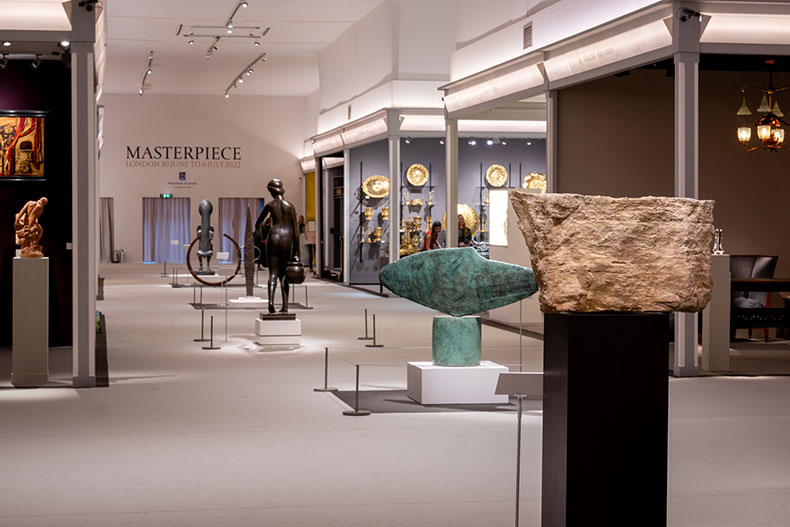The news that this year’s edition of Masterpiece is cancelled was not a promising start to 2023 for the London art market. Though 2022 had been surprisingly strong, it was nonetheless mired by a foreboding sense that the knock-on effects of war, the energy crisis, inflation and global recession were waiting just around the corner. Sure enough, MCH Group, which acquired Masterpiece last year, having had a 67.5 per cent stake since 2017, cited ‘escalating costs and a decline in the number of international exhibitors’ as reasons that the event is no longer ‘commercially viable.’ Just a fortnight later – perhaps anticipating less collector interest in the capital during late June, when Masterpiece was traditionally held – the Art & Antiques Fair Olympia also called off its summer edition.

The entrance to the 2022 edition of Masterpiece. Photo: Stephen Chung / Alamy Live News
With the pandemic no longer an all-purpose excuse for disappointing turnouts or tepid sales, businesses must face up to the harsh reality of economic downturn. As Lucie Kitchener, CEO of Masterpiece, points out, the fair’s operations relied on some of the hardest hit industries, like transport and hospitality. Meanwhile inflation, a global issue, is particularly acute in the United Kingdom. Kitchener’s team had anticipated the 30 per cent increase in costs from 2019 to 2022, driven primarily by Brexit, the pandemic and war in Ukraine. But a further 10 to 11 per cent was projected for 2023 – with inflation a major factor – pushing the fair beyond profitability. ‘You can see the costs only going in one direction in the short term,’ she says.
Falling exhibitor participation was the final nail in the coffin for an already overstretched budget. ‘I think this is very clearly the impact of Brexit,’ says Kitchener, explaining that although international participation fell 58 per cent overall from 2018 to 2022, this loss was mainly from the continent. The proportion of European dealers taking part fell by half from 25 per cent to 12.5 per cent in that period. Although the number of North American dealers also fell from 13 per cent to 8 per cent, the number of Asian dealers made modest gains from two in 2018 to five in 2019 and four in 2022.
‘I expected that the show would be cancelled,’ claims Valerio Turchi, an antiquities specialist who routinely made the trip to London from Rome. ‘My experience at Masterpiece has always been positive with the exception of last year, when everything became more difficult and complicated. These drastic changes are undoubtedly attributed to Brexit,’ he added, mentioning the new burdens of additional documentation and a five per cent levy on artworks imported into the United Kingdom from the European Union.
Brexit has become notorious for introducing inefficiencies for foreign traders. Having returned for its 35th edition in January, the London Art Fair reported healthy sales and attendance. Despite this, portfolio director Sarah Monk reported: ‘We understand one or two galleries were impacted in shipping their works to the fair [by] some delays in custom clearance due to increased red-tape post-Brexit. London’s foothold as a global centre for the art market clearly requires the government to review the barriers that [this] creates.’ The luxury goods sector has been dealt a particularly severe blow by the United Kingdom’s abolition of VAT refunds for international customers in 2020, disastrous for a cross-disciplinary fair like Masterpiece with its strong contingent of jewellers.

A Triceratops skull at the David Aaron stand at Masterpiece in 2022. Photo: Stephen Chung / Alamy Live News
Whether it was foreseeable or not, the cancellation appears to have rattled many London dealers. Salomon Aaron, director of David Aaron, whose stand turned heads last year with its vast triceratops skull, told Apollo: ‘I was really surprised that it happened.’ According to Jonathan Green, CEO of Richard Green, ‘It’s upsetting because we loved the fair and it was very successful for us.’ Highlighting ‘a fantastic location, established name and regular clientele’ among the reasons that Masterpiece would be almost impossible to replace, Polly Bielecka, director of Pangolin, added: ‘The implications for a small gallery are huge. I think everyone assumes every gallery makes their fortunes at these fairs but it’s not just financial, it’s one of our key marketing moments.’
There is no clear consensus on what will happen next. ‘I don’t think it will have a long-term impact on trade in London,’ says Aaron. ‘London has some of the best galleries and museums in the world and will always be one of the centres of the art market.’ But not everyone is so optimistic. ‘I’m worried it signals a more permanent change for the London art market,’ says Bielecka. ‘Perhaps it was a short-sighted decision if it was just based on financial matters. The main thing is a loss of confidence, which is always going to make people question whether to invest here or come here so that’s a huge knock-on effect.’
If businesses in the United Kingdom hope to avoid today’s problems being compounded long-term, they must find new workarounds. ‘Some of the things that the European dealers are facing are things that we can address, I’m sure,’ says Kitchener. ‘I’m a passionate believer in London and believe it still has an enormous amount to offer. We need to create more opportunity, which is a much broader question than one art fair. A lot of people want to write about this as the beginning of a relentless decline,’ she adds, ‘but I think it’s getting to grips with Brexit challenges post-pandemic, having not really had the opportunity.’

Masterpiece 2022. Photo: Ben Fisher Photography; courtesy Masterpiece London
Today’s glut of glitzy fairs must inevitably shrink over time, according to Green, who adds ‘Frieze seems to be able to get it right, as far as pitching it at a certain level. They’re not spending a fortune so maybe the more simplified look is sustainable. It’s lovely to have beautiful surroundings but what’s really important is the goods.’
‘I can’t see [Masterpiece] coming back in the same format,’ admits Kitchener. ‘We’re starting with a blank piece of paper and looking at what we might do. MCH have kept the brand, so I think they are keen to find a way to make it work again.’

What does the loss of Masterpiece mean for London?
An artwork by Lakwena Maciver overhanging the bar at Masterpiece 2022. Photo: Ben Fisher Photography; courtesy Masterpiece London
Share
The news that this year’s edition of Masterpiece is cancelled was not a promising start to 2023 for the London art market. Though 2022 had been surprisingly strong, it was nonetheless mired by a foreboding sense that the knock-on effects of war, the energy crisis, inflation and global recession were waiting just around the corner. Sure enough, MCH Group, which acquired Masterpiece last year, having had a 67.5 per cent stake since 2017, cited ‘escalating costs and a decline in the number of international exhibitors’ as reasons that the event is no longer ‘commercially viable.’ Just a fortnight later – perhaps anticipating less collector interest in the capital during late June, when Masterpiece was traditionally held – the Art & Antiques Fair Olympia also called off its summer edition.
The entrance to the 2022 edition of Masterpiece. Photo: Stephen Chung / Alamy Live News
With the pandemic no longer an all-purpose excuse for disappointing turnouts or tepid sales, businesses must face up to the harsh reality of economic downturn. As Lucie Kitchener, CEO of Masterpiece, points out, the fair’s operations relied on some of the hardest hit industries, like transport and hospitality. Meanwhile inflation, a global issue, is particularly acute in the United Kingdom. Kitchener’s team had anticipated the 30 per cent increase in costs from 2019 to 2022, driven primarily by Brexit, the pandemic and war in Ukraine. But a further 10 to 11 per cent was projected for 2023 – with inflation a major factor – pushing the fair beyond profitability. ‘You can see the costs only going in one direction in the short term,’ she says.
Falling exhibitor participation was the final nail in the coffin for an already overstretched budget. ‘I think this is very clearly the impact of Brexit,’ says Kitchener, explaining that although international participation fell 58 per cent overall from 2018 to 2022, this loss was mainly from the continent. The proportion of European dealers taking part fell by half from 25 per cent to 12.5 per cent in that period. Although the number of North American dealers also fell from 13 per cent to 8 per cent, the number of Asian dealers made modest gains from two in 2018 to five in 2019 and four in 2022.
‘I expected that the show would be cancelled,’ claims Valerio Turchi, an antiquities specialist who routinely made the trip to London from Rome. ‘My experience at Masterpiece has always been positive with the exception of last year, when everything became more difficult and complicated. These drastic changes are undoubtedly attributed to Brexit,’ he added, mentioning the new burdens of additional documentation and a five per cent levy on artworks imported into the United Kingdom from the European Union.
Brexit has become notorious for introducing inefficiencies for foreign traders. Having returned for its 35th edition in January, the London Art Fair reported healthy sales and attendance. Despite this, portfolio director Sarah Monk reported: ‘We understand one or two galleries were impacted in shipping their works to the fair [by] some delays in custom clearance due to increased red-tape post-Brexit. London’s foothold as a global centre for the art market clearly requires the government to review the barriers that [this] creates.’ The luxury goods sector has been dealt a particularly severe blow by the United Kingdom’s abolition of VAT refunds for international customers in 2020, disastrous for a cross-disciplinary fair like Masterpiece with its strong contingent of jewellers.
A Triceratops skull at the David Aaron stand at Masterpiece in 2022. Photo: Stephen Chung / Alamy Live News
Whether it was foreseeable or not, the cancellation appears to have rattled many London dealers. Salomon Aaron, director of David Aaron, whose stand turned heads last year with its vast triceratops skull, told Apollo: ‘I was really surprised that it happened.’ According to Jonathan Green, CEO of Richard Green, ‘It’s upsetting because we loved the fair and it was very successful for us.’ Highlighting ‘a fantastic location, established name and regular clientele’ among the reasons that Masterpiece would be almost impossible to replace, Polly Bielecka, director of Pangolin, added: ‘The implications for a small gallery are huge. I think everyone assumes every gallery makes their fortunes at these fairs but it’s not just financial, it’s one of our key marketing moments.’
There is no clear consensus on what will happen next. ‘I don’t think it will have a long-term impact on trade in London,’ says Aaron. ‘London has some of the best galleries and museums in the world and will always be one of the centres of the art market.’ But not everyone is so optimistic. ‘I’m worried it signals a more permanent change for the London art market,’ says Bielecka. ‘Perhaps it was a short-sighted decision if it was just based on financial matters. The main thing is a loss of confidence, which is always going to make people question whether to invest here or come here so that’s a huge knock-on effect.’
If businesses in the United Kingdom hope to avoid today’s problems being compounded long-term, they must find new workarounds. ‘Some of the things that the European dealers are facing are things that we can address, I’m sure,’ says Kitchener. ‘I’m a passionate believer in London and believe it still has an enormous amount to offer. We need to create more opportunity, which is a much broader question than one art fair. A lot of people want to write about this as the beginning of a relentless decline,’ she adds, ‘but I think it’s getting to grips with Brexit challenges post-pandemic, having not really had the opportunity.’
Masterpiece 2022. Photo: Ben Fisher Photography; courtesy Masterpiece London
Today’s glut of glitzy fairs must inevitably shrink over time, according to Green, who adds ‘Frieze seems to be able to get it right, as far as pitching it at a certain level. They’re not spending a fortune so maybe the more simplified look is sustainable. It’s lovely to have beautiful surroundings but what’s really important is the goods.’
‘I can’t see [Masterpiece] coming back in the same format,’ admits Kitchener. ‘We’re starting with a blank piece of paper and looking at what we might do. MCH have kept the brand, so I think they are keen to find a way to make it work again.’
Unlimited access from just $16 every 3 months
Subscribe to get unlimited and exclusive access to the top art stories, interviews and exhibition reviews.
Share
Recommended for you
Does the Old Masters market need to learn some new tricks?
Are collectors less interested than they used to be, or is the trade showing a lack of imagination? Five experts weigh in.
How healthy is the market for Old Masters?
Blockbuster shows and occasional auction records can seem at odds with the lukewarm interest from collectors
In good company – at the Vintners’ Hall in the City of London
The Worshipful Company of Vintners still provides a very convivial welcome